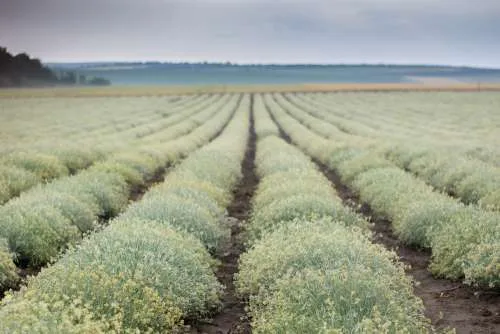Study this course if you want to start your own herb farm or herb nursery. This is a very detailed course that has been designed to teach you how to start your own commercial herb business but is still suitable for anyone just wanting a successful herb garden!
- Study in your own time and at your own pace.
- 12 months to complete (extensions available).
- Tutor support by experienced, professional horticulturalists.
- Learn herbs online.
- Start your own herb business.
If you want to gain a very solid understanding of herbs, their culture and how to set up your own herb business then you need look no further. This would have to be one of the most detailed herb courses around. This is not a light weight course; you will be challenged throughout.
This course is designed to develop a solid grounding in herb growing and the herb industry. Half of the course deals with general herb culture, including identification, soils, mulching, feeding, watering, propagation, pest & disease control, harvest, storage, processing, companion planting, nursery management and herb farming. The remainder of the course involves detailed studies of major groups of herbs such as: mints, thymes, lavenders, scented geraniums, garlic, roses, artemisias and parsley.
Course Aims:
- Differentiate between different varieties of herbs in cultivation.
- Explain the general cultural practices used for the growing of herbs.
- Determine harvest and post harvest techniques for herb crops, including processing, storage and use of herbs.
- Develop a production plan for a herb crop grown for harvesting.
- Develop a production plan for a herb nursery.
- Design a herb garden for a home or public garden.
- Evaluate the production of herbs or herb products in a commercial business.
There are 12 lessons in this course:
There are 12 lessons in this course:
- Unit 1: Introduction to Herb Culture
- Lesson 1.1 Introduction to Herbs – definitions, uses, classification of herbs, using a botanical key
- Lesson 1.2 Cultural Techniques – planting, soils, drainage, feeding, mulching, composting, pruning
- Lesson 1.3 Propagation Techniques – propagation mixes, growing structures, cuttings, seed, separation & division, layering
- Lesson 1.4 Identification of Plant Health Problems – pests & diseases, frost, heat, water stress, etc.
- Unit 2: Using Herbs
- Lesson 2.1 Processing & Use of Herbs – medicinal, culinary, perfumes, dyes, oils, distillation processes, etc.
- Lesson 2.2 Harvesting & Storage – air drying, oven drying, microwave drying, freezing, fresh storage, when & how to harvest.
- Unit 3: The Mints (Lamiaceae)
- Lesson 3.1 Mentha Species – peppermint, spearmint, applemint, wintermint, pennyroyal, corsican, ginger mint etc.
- Lesson 3.2 Lavandula and Thymus (lavender & thyme)
- Lesson 3.3 Other Lamiaceae Herbs – lemon balm, hyssop, rosemary, bee balm (monarda), basil, savory, marjoram, sage, etc.
- Unit 4: The Daisies (Asteraceae)
- Lesson 4.1 Artemisia Species – southernwood, wormwood, tarragon, mugwort
- Lesson 4.2 Other Asteraceae Herbs – chamomile, tansy, safflower, costmary, yarrow, calendula, dandelion, etc.
- Unit 5: The Parsley Family (Apiaceae)
- Lesson 5.1 The Apiaceae (Umbelliferae) Family – parsley, coriander, dill, caraway, angelica, cumin, fennel, lovage, sweet cicely, etc.
- Unit 6: The Onion Group
- Lesson 6.1 Chives, leek, garlic chives, tree onion, welsh onion, etc.
- Lesson 6.2 Garlic
- Unit 7: Other Herbs
- Lesson 7.1 Rosaceae – roses, burnet, strawberry, blackberry, etc.
- Lesson 7.2 Miscellaneous Herbs – lemon grass, lemon verbena, bay, sorrel, dock, juniper, horseradish, evening primrose, etc.
- Lesson 7.3 Scented Geraniums
- Lesson 7.4 Australian Native Herbal Plants – eucalyptus and others
- Unit 8: Pests & Diseases
- Lesson 8.1 Companion Planting
- Lesson 8.2 Natural Pest Control – herb sprays, biological control, etc.
- Unit 9: Landscaping
- Lesson 9.1 Landscape Design Principles and Practices – how to draw a landscape plan
- Lesson 9.2 Home Gardening With Herbs – cottage gardens, hedges & borders, tubs, baskets, kitchen gardens, herb lawns, herb indoor plants.
- Lesson 9.3 Public Landscaping – historic herb gardens (e.g. knot gardens), herbs for low maintenance & colour in parks, etc.
- Unit 10: Herb Farming I
- Lesson 10.1 Establishing & Operating a Herb Nursery – open ground vs container growing, nursery layout, potting soils, pots and labels, marketing, etc.
- Unit 11: Herb Farming II
- Lesson 11.1 Establishing & Operating a Herb Farm – soil preparation and management (plastic mulch, organic mulches, cultivation), row cropping
- Unit 12: Herb Farming III
- Lesson 12.1 Evaluating Herb Enterprises – assessing market demand, deciding how to proceed.
Each lesson culminates in an assignment which is submitted to the school, marked by the school’s tutors and returned to you with any relevant suggestions, comments, and if necessary, extra reading.

